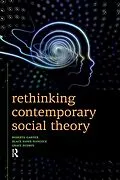The authors recontextualize contemporary sociological theory to argue that in recent decades sociology has been deeply permeated by a new paradigm, conflict constructionism. Their analysis integrates and sheds new light on eight prominent domains of recent social thought: the micro-level; discourses, framing, and renewed interest in signs and language; the construction of difference and dominance; regulation and punishment; cultural complexity and transculturation; the body; new approaches to the role of the state; and a consistent conflict perspective.
The paradigm combines elements of both social construction theory and conflict theory. It has deep roots in critical theory and more recent links to postmodernism. It is associated with postmodern social thought, although it is less radical and more adaptable to empirical inquiry than postmodernism. The authors tie their new conceptualization of social theory to contemporary applications of social theory in everyday life.
Features of this text:
Autorentext
Roberta Garner, Black Hawk Hancock, Grace Budrys
Inhalt
Part I Paradigms; Chapter 1 Paradigms in Sociology; Chapter 2 Conflict Constructionism; Chapter 3 History of a Paradigm; Part II Paradigm Change in Selected Subfields; Deep Impact: The New Paradigm Becomes Dominant; Chapter 4 Constructing Difference and Dominance; Chapter 5 Culture in an Era of Globalization, José Soltero; Chapter 6 Media in the Information Age; Chapter 7 Sociology of the Self; Paradigms in Play; Chapter 8 Political Sociology and the Analysis of Collective Action; Chapter 9 Urban Sociology and Spatial Analysis; Chapter 10 Disruptions in the Field Formerly Known as Sociology of Deviance, Greg Scott, Julian Thompson; Paradigm Limited; Chapter 11 Social Class and Socioeconomic Inequality; Chapter 12 Contemporary Theories of Family Life, Tait Runnfeldt Medina, Julie E. Artis; Paradigms Reconstituted in a Transdisciplinary Field; Chapter 13 The Sociology of Health, Illness, and Medical Practice, Grace Budrys; conclusion Conclusion;
